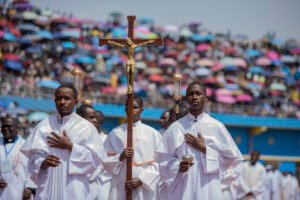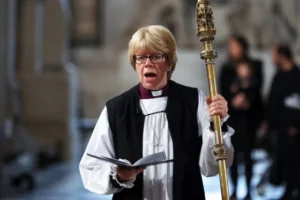Guli Francis-Dehqani: A Pioneering Candidate for Archbishop of Canterbury

Guli Francis-Dehqani
https://youtu.be/eVFo96bSyxA
Introduction to Guli Francis-Dehqani
Guli Francis-Dehqani stands as a significant figure in the contemporary Church of England, recognized not only for her extensive knowledge and experience but also for her pioneering journey within a traditionally conservative institution. Born to Iranian parents, her multicultural heritage has profoundly influenced her approach to ministry and leadership. This background has rendered her uniquely equipped to navigate the diverse landscape of modern Britain, where the church serves increasingly multicultural communities.
Her educational journey commenced at the University of Cambridge where she pursued theology, laying a solid foundation for her ecclesiastical career. Following her undergraduate studies, she continued her religious education at the University of Oxford, earning a postgraduate degree that further amplified her theological insights. This academic rigor has been pivotal in her approach to ministry, cultivating a depth of knowledge that is both respected and sought after within ecclesiastical circles.
Guli’s professional path within the Church of England is marked by significant tenure in various roles, starting with her ordination as a priest in 2006. She has served in multiple capacities, including as a curate and later as the vicar of All Saints’ Church in the heart of London. Her leadership style is characterized by inclusivity and a commitment to social justice, embodying the ethos of a church that aims to reach all individuals irrespective of their backgrounds.
Her appointment as the Bishop of Loughborough in 2019 further solidified her reputation as a forward-thinking leader advocating for change and reform. As she emerges as a contender for the role of Archbishop of Canterbury, Guli Francis-Dehqani’s journey from her roots to her current position illustrates not only her qualifications but also her vision for a church that embraces diversity, compassion, and collaboration. This journey promises to inspire others within the faith community and beyond.
Significance of the Archbishop of Canterbury Position
The role of the Archbishop of Canterbury holds a prestigious and pivotal position within the Church of England and the broader Anglican Communion. Historically, this office has served not only as a symbol of unity but also as a central figure in the spiritual leadership of the Anglican tradition. Appointed as the first bishop of the Church of England, the Archbishop oversees the spiritual and administrative affairs of the church, providing direction and guidance to its vast network of bishops and clergy.
One of the primary responsibilities of the Archbishop is to serve as a spiritual leader for Anglicans worldwide. The Archbishop represents the Church of England in ecumenical dialogues and interfaith discussions, promoting values of peace, tolerance, and mutual respect. This role helps the Anglican Communion maintain its theological integrity while adapting to diverse cultural contexts across the globe. The Archbishop is also tasked with addressing contemporary issues that affect both the church and society, reinforcing the Church’s commitment to social justice and ethical living.
In addition to spiritual leadership, the Archbishop of Canterbury has significant influence within the political realm, often advising government officials on moral and ethical matters. The position is viewed as a moral compass for society, representing Christian values in public discourse. Furthermore, the Archbishop’s involvement in various charitable initiatives plays a crucial role in fostering community relations and promoting humanitarian efforts, thereby reinforcing the church’s mission to serve others.
This esteemed position, dating back to the 6th century, has evolved but remains instrumental in shaping the direction of not just the Church of England, but also the Anglican Communion at large. The continued importance of this office illustrates the enduring role of the Archbishop of Canterbury as both a spiritual beacon and a moral leader in an ever-changing world.
Breaking the Glass Ceiling: Potential First Female Archbishop
Guli Francis-Dehqani’s candidacy for the Archbishop of Canterbury marks a significant milestone in the history of the Church of England, as she stands as a potential first female in a role that has traditionally been occupied by men. This pivotal moment carries profound implications not just for the leadership of the Church, but also for wider discussions surrounding gender equality and representation within religious institutions. The advancement of a female leader to such an esteemed position challenges long-standing norms and serves as a symbol of shifting perspectives regarding women’s roles in ecclesiastical authority.
The appointment of a female Archbishop could serve as a catalyst for change within the Church of England, emphasizing the urgent need for inclusivity and diversity at all levels of leadership. A female Archbishop could inspire a new wave of female clergy and lay leaders, enabling them to envisage their own potential within the Church. It sends a powerful message that leadership can come in many forms and backgrounds, thereby enriching the Church’s ability to connect with its diverse congregation.
Moreover, the presence of a woman in such a high-ranking ecclesiastical office could lead to a transformation of the Church’s priorities, potentially fostering a more compassionate and inclusive approach to contemporary issues. A female leader might place greater emphasis on matters such as social justice, mental health, and community engagement, aligning the Church’s mission with the pressing needs of society today. All of these factors contribute to a broader representation in a male-dominated sphere, altering the trajectory of the Church’s future.
As Guli Francis-Dehqani’s candidacy unfolds, the ripples of her potential landmark position will likely influence future generations, encouraging them to pursue pathways in leadership that were previously deemed inaccessible. In exploring the implications of her nomination, it becomes evident that her potential archbishopric could well signify a groundbreaking change within the Church and beyond, promoting a renewed vision for inclusivity and representation.
Guli’s Vision for the Church
Guli Francis-Dehqani envisions a Church of England that is both grounded in its rich tradition and open to the evolving needs of contemporary society. Central to her theological perspective is the belief that the Church must serve as a beacon of hope and inclusivity. She advocates for a re-examination of doctrines and practices that may inadvertently alienate members of the community, particularly marginalized groups. By promoting a theology that emphasizes love, justice, and reconciliation, Guli seeks to foster an environment where diverse voices are heard and valued.
Modernization is a pivotal aspect of Guli’s vision. She acknowledges that many in today’s society are disenchanted with traditional religious practices and seeks to address this disconnect by integrating innovative approaches to worship and outreach. This includes utilizing technology to enhance congregational life and facilitate greater access to spiritual resources. For Guli, reimagining church activities to reflect 21st-century realities is essential for attracting younger generations and re-engaging those who have drifted away from formal religious expressions.
Community engagement is another cornerstone of her vision. Guli believes that the Church has a responsibility to be actively involved in local initiatives that address pressing social issues, such as poverty, mental health, and climate change. By fostering partnerships with local organizations, she aims to position the Church as a proactive force for social good. This approach not only strengthens community bonds but also demonstrates the Church’s commitment to living out its faith through action.
Furthermore, Guli’s vision extends to addressing contemporary challenges within the Anglican Communion. By promoting open dialogue and collaboration among diverse Anglican traditions, she aims to cultivate unity amid diversity. Her leadership would prioritize reconciliation and understanding, guiding the Church toward a more integrated and harmonious future. In conclusion, Guli Francis-Dehqani’s multifaceted vision emphasizes inclusivity, modernization, community outreach, and collaboration, aiming for a revitalized Church that resonates with today’s society.
Support and Endorsements
Guli Francis-Dehqani, recognized as a pioneering candidate for the Archbishop of Canterbury, has garnered significant support and endorsement from various leaders within the Church as well as congregants. The breadth of her endorsements reflects her widespread appeal and the confidence that many have in her leadership capabilities and vision for the future of the Church. Prominent church leaders have publicly articulated their support, emphasizing her commitment to inclusivity and her innovative approach to ministry. For instance, Archbishop Justin Welby praised her for her “deep pastoral instinct and insightful theological perspective,” highlighting the qualities that make her an exemplary candidate for this esteemed position.
Francis-Dehqani’s work within her local community has also resonated with congregants. Many members of her flock have shared testimonials regarding her compassionate outreach and her ability to engage with diverse groups, fostering a sense of belonging. A member of her congregation stated, “Guli has a unique way of connecting with people. Her vision for the Church truly reflects the diverse backgrounds we represent.” This sentiment has been echoed by various individuals who appreciate her dedication to promoting unity and understanding within the Church. Furthermore, numerous inter-denominational collaborative initiatives led by her have not only bolstered her reputation but have also showcased her ability to work towards a common goal among different faith communities.
The endorsements Guli Francis-Dehqani has received illuminate the strong belief in her strategical vision for the Episcopal Church’s direction. Supporters affirm that her leadership would catalyze progress, facilitate dialogue, and encourage pastoral care in response to a changing cultural landscape. Her innovative style and advocacy for social issues have energized many within the religious community, further solidifying her position as a noteworthy candidate for the next Archbishop of Canterbury.
Challenges Ahead
Guli Francis-Dehqani’s candidacy for the Archbishop of Canterbury is indeed historic; however, it is not without substantial challenges that she may encounter as she moves forward in her journey. One significant hurdle will likely be the resistance from traditionalists within the Church of England, who may be hesitant to accept a female leader in such a prominent role. The Church has a long-standing patriarchal structure, and her rise to the position may be met with skepticism and pushback from those who are staunchly committed to preserving traditional ecclesiastical norms. This resistance could manifest in both subtle and overt forms, making it crucial for Francis-Dehqani to engage thoughtfully and strategically with her detractors to garner support from different factions within the Church.
Additionally, the complexities of church politics present another layer of challenge. The appointment of an Archbishop involves navigating a landscape filled with diverse opinions and competing interests. Aligning the various parties—bishops, clergy, and laypeople—around her vision for the Church is essential, yet it can prove difficult given the historical context and the existing power structures. There is also the potential for political maneuvering that could complicate the decision-making process, highlighting the importance of coalition-building and diplomacy in her leadership style.
Lastly, societal expectations regarding the role of women in leadership and ongoing discussions surrounding inclusivity will undoubtedly shape Francis-Dehqani’s path. As the Church seeks to address issues of modernity and relevance, she will need to balance these societal pressures with the intrinsic values of the Church. The intersection of her identity as a female leader and her commitment to tradition will be critical as she confronts these challenges. In summary, while Guli Francis-Dehqani’s candidacy opens doors for progress, she must navigate a complex web of traditionalist resistance, political intricacies, and societal expectations to forge a successful path as Archbishop of Canterbury.
Public Perception and Media Coverage
The candidacy of Guli Francis-Dehqani for the Archbishop of Canterbury has elicited a significantly varied response from the public and media alike. Generally, her nomination has been met with a wave of support, particularly among progressive circles that value diversity and inclusiveness within the Church. Guli Francis-Dehqani, as the first female bishop in the Church of England, represents a transformative shift toward gender equality, a point that media outlets emphasize in their coverage. Articles in prominent newspapers have celebrated her background and unique story, portraying her as a pioneering figure who challenges traditional norms.
Social media platforms have served as a barometer for public sentiment, where both supportive and critical voices converge. Supporters express admiration for her leadership style and commitment to justice, often using hashtags to amplify their support. Alternatively, critics have raised concerns about her approach to theological debate, with some asserting that her views signify a drift from traditional doctrines. This contention regarding her candidacy reflects larger conversations about the future direction of the Church and the role of women within its hierarchy.
Media narratives surrounding Guli Francis-Dehqani’s candidacy have generally framed her as an embodiment of hope for many who desire reform within the institution. Yet, the media’s portrayal has not been monolithic. Coverage in more conservative outlets tends to focus on her progressive stances and how they may alienate traditionalists, thereby fostering an environment for heated discourse. Consequently, her candidacy is presented within a context that balances her groundbreaking achievements with the controversies they may incite. Overall, this dynamic narrative underlines the complexities of public perception regarding this pivotal moment in ecclesiastical leadership.
Comparison with Previous Archbishops
Guli Francis-Dehqani’s candidacy for the Archbishop of Canterbury presents a unique opportunity to compare her potential leadership style and theological approach with those of her predecessors. Historically, the role of the Archbishop has been characterized by a variety of leadership styles that reflect the evolving priorities of the Church of England. For instance, the tenure of George Carey, who served from 1991 to 2002, emphasized a more traditional interpretation of Anglicanism, whereas Rowan Williams, his successor, focused on multiculturalism and inclusivity, often facilitating deeper theological discourse within the global Anglican Communion.
Similarly, Justin Welby, who took office in 2013, has navigated complex social issues such as economic disparity and social justice, advocating for a church that actively engages with contemporary societal challenges. His hands-on approach has transformed the office into one that is critically responsive, rather than merely prescriptive. In contrast, Francis-Dehqani brings a background steeped in pastoral care and mission-focused leadership, which may introduce a fresh perspective to the role. Her experiences as the first female Bishop of Loughborough underline her commitment to breaking traditional barriers within church hierarchy, signaling potential shifts in how the Anglican Communion may engage with gender and diversity issues.
Moreover, analyzing their theological approaches reveals intriguing contrasts. While some predecessors adhered closely to established doctrines, Francis-Dehqani’s background as a scholar may encourage a broader interpretation of Anglican theology, potentially fostering dialogue on pressing contemporary issues. Likewise, her experiences within diverse cultural contexts may enable her to facilitate richer conversations around interfaith collaboration. Ultimately, Guli Francis-Dehqani’s leadership, should she assume the role, represents not only a continuation but also an evolution of the Archbishop’s office, echoing the historical necessity for the Church to adapt to an increasingly complex spiritual landscape.
Conclusion and Future Prospects
In assessing Guli Francis-Dehqani’s candidacy for Archbishop of Canterbury, it becomes evident that her journey symbolizes a critical evolution within the Anglican Communion. As a trailblazer, she not only represents a shift toward a more inclusive leadership model but also embodies the potential for progressive change within the Church. Her diverse background and extensive experience in pastoral and academic realms uniquely position her to address contemporary challenges facing the Anglican community.
Moreover, Francis-Dehqani’s emphasis on social justice, interfaith dialogue, and community engagement resonates with the growing demands for relevance in an increasingly secular society. Should she assume the role of Archbishop, her leadership would likely inspire similar leaders to emerge, contributing to a richer tapestry of voices within the Church. This could lead to an Anglican Communion that is more reflective of its global constituency, aiming to meet the spiritual and social needs of its diverse membership.
Even if Francis-Dehqani does not become the Archbishop, her influence will likely persist, serving as a benchmark for future candidates. Her advocacy for inclusivity and change challenges traditional norms, inspiring both clergy and laity to rethink their approaches to theological and social issues. The mere candidacy of Guli Francis-Dehqani has already ignited discussions on leadership, gender, and the role of faith in contemporary society, shaping the narrative around what it means to lead within the Church.
Ultimately, the future prospects for Guli Francis-Dehqani, whether in the role of Archbishop or as a prominent leader within the Anglican community, signify a movement towards a more progressive and responsive ecclesial structure. The legacy she embraces and promotes may very well set a precedent for generations of leaders to come, marking a pivotal juncture in the story of the Church.











